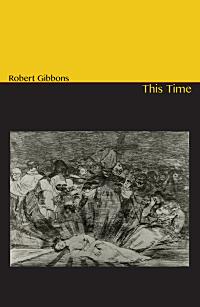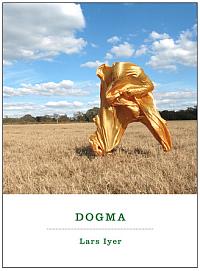|

photo - mw
_______________________
from The Sonnets 2 Orpheus
Kent Leatham
eratio
(....)
10.
“Euch, die ihr nie…”
Hey you, hard-drive for the Ancient of Days—
(or is that backwards? Sarcophagus
for all tomorrow’s blogs and tweets?)—
Either way, we salute thee, as worms salute
the rain that drives them to sidewalks to drown
in the shapes of question marks and musical clefs.
Cliffs. Clefts. Whatever it takes to shepherd us toward
grappa infused with stinging nettles and lemon peel,
or White Russians made with your mother’s milk.
(Do you look upon her breasts with disgust
or sadness? Would you climb back between her legs
for a chance to be held?) The angels in the graveyards know
what it means to remember, what it means to forget.
Drink up! (Intendant Caesars rose and / Left,
slamming the door.)
(final line from W.H. Auden's "In Praise of Limestone")
...(more)
_______________________
'list'
M/C Volume 15 Issue 5 October 2012
Why Writers Hate the Second Law of Thermodynamics:
Lists, Entropy and the Sense of Unending
Darren John Tofts
(....)
The nouveau roman made a fine if myopic art of isolating detail for detail’s sake. However, it shares with both Beckett’s minimalism and Joyce’s maximalism the obligation of fiction to fill its world with stuff (“maximalism” is a term coined by Michel Delville and Andrew Norris in relation to the musical scores of Frank Zappa that opposes the minimalism of John Cage’s work). Kenner asks, in The Stoic Comedians, where do the “thousands on thousands of things come from, that clutter Ulysses?” His answer is simple, from “a convention” and this prosaic response takes us to the heart of the matter with respect to the impact on writing of Isaac Newton’s unforgiving Second Law of Thermodynamics. In the law’s strictest physical sense of the dissipation of heat, of the loss of energy within any closed system that moves, the stipulation of the Second Law predicts that words will, of necessity, stop in any form governed by convention (be it of horror, comedy, tragedy, the Bildungsroman, etc.). Building upon and at the same time refining the early work on motion and mass theorised by Aristotle, Kepler, and Galileo, inter alia, Newton refined both the laws and language of classical mechanics. It was from Wiener’s literary reading of Newton that Kenner segued from the loss of energy within any closed system (entropy) to the running silent out of words within fiction....(more)
_______________________
Late and Soon, Getting and Spending: Prose Sonnets on Dailiness
Jessica Baran
bomb
_______________________
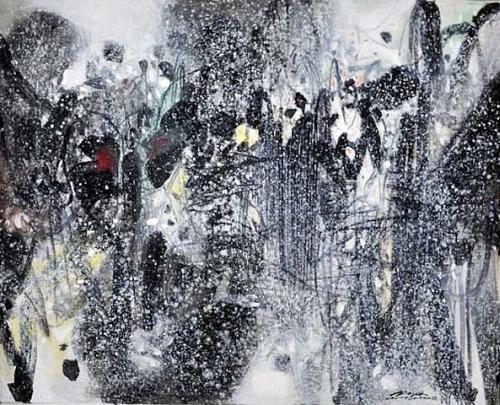
Ecriture Hivernale
1989
Chu Teh-Chun
b. October 24,1920
_______________________
Like the legal system, the American education system recognizes only precedent. Unlike the legal system, it often maintains a formal posture of disavowal of this lack of inherent authority. This doesn’t make true creativity impossible, just uncomfortable. The relation between the arts and education is cousinly: while kissing may be fine, copulation may cripple the child.
Is it possible to teach creativity within these constraints? Is it possible to teach creativity at all?
It is possible to teach creatively, perhaps. I am not sure if it is desirable to teach creativity: the students seem well armed with creation. The task is more to teach premeditation, the possibility of a skeleton within the pile of flesh.
—
Teaching in the Margins: Vanessa Place
_______________________
‘The Elephant Has Left the Room’: Jacket magazine and the Internet
John Tranter
Journal of the Association for the Study of Australian Literature, Vol 12, No 1 (2012)
Abstract
Australian poet John Tranter trained in all aspects of publishing, from hand-lettering to editing, from litho platemaking to screen printing, and developed an early familiarity with computers. The development of the Internet in the 1990s found him armed with a formidable array of skills. He published the free international Internet-only magazine Jacket single-handed in 1997. Jacket quickly grew to become the most widely read and highly respected literary magazine ever published from Australia. In late 2010 John Tranter gave it to the University of Pennsylvania, where it continues to flourish. This memoir traces John Tranter’s publication of literary materials on the Internet including the technical and literary problems faced by Jacket, and outlines the many other projects that resulted in the Internet publication of over fifty thousand mostly Australian poems, articles, reviews, interviews and photographs.
_______________________
Dante’s Tenth Circle
Deborah Tennen
mcsweeneys
(....)
I cautiously approached the shade closest to me, standing tense so as not to tremble: “What was your discipline?” I asked. “What brought you to this place?” The shade’s head was fully obscured, so his professor spoke for him as he had done, too, in life: “This student occupied himself with the implications of Heideggerian philosophy in contemporary humanistic discourse,” he responded.
There ended that interaction as I could not have cared any less than I did in that moment.
I stopped then at an elderly derričre, wrinkled from its years of experience yet swollen more than any other I had yet seen. “And why is it that your behind is inflated more than all the others?” I inquired. The professor responded: “this shade was my pupil, studying toward a PhD in postmodern reinterpretations of 11th-century lyric poetry.”
...(more)
via
_______________________

photo - mw
_______________________
Butter
assemblage by John Latta
Isola di Rifiuti
So bring the scenery with you.
Midwife to gargoyles, as if all or something
were appropriate, you circle the time inside you,
plant an asterisk next to a kiss,
and it was going to be okay again, and the love
of which much was made settles closer, is a paw
against a wrist. Hasn’t finished yet,
through the bread-and-butter machine continues to churn out
faxes, each grisette has something different
about her forehead, is as a poinsettia
in the breeze of Rockefeller Center. I don’t like
a glacier telling me to hurry up, the ride down is precipitous.
— John Ashbery, out of “And the Stars Were Shining” (And the Stars Were Shining, 1995)
...(more)
_______________________
Philosopher's Pipe
Philosophy podcasts piped into one place
A Digital Humanities project
via Stephen Downes

photo - mw
_______________________
September 1961
Denise Levertov
b. October 24, 1923
This is the year the old ones,
the old great ones
leave us alone on the road.
The road leads to the sea.
We have the words in our pockets,
obscure directions. The old ones
have taken away the light of their presence,
we see it moving away over a hill
off to one side.
They are not dying,
they are withdrawn
into a painful privacy
learning to live without words.
E. P. "It looks like dying"--Williams: "I can't
describe to you what has been
happening to me"--
H. D. "unable to speak."
The darkness
twists itself in the wind, the stars
are small, the horizon
ringed with confused urban light-haze.
They have told us
the road leads to the sea,
and given
the language into our hands.
We hear
our footsteps each time a truck
has dazzled past us and gone
leaving us new silence.
One can't reach
the sea on this endless
road to the sea unless
one turns aside at the end, it seems,
follows
the owl that silently glides above it
aslant, back and forth,
and away into deep woods.
But for us the road
unfurls itself, we count the
words in our pockets, we wonder
how it will be without them, we don't
stop walking, we know
there is far to go, sometimes
we think the night wind carries
a smell of the sea...
Denise Levertov feature
Editor: Kevin Gallagher jacket 36
_______________________
Three Poems
Arseny Tarkovsky
translated from the Russian by Philip Metres and Dimitri Psurtsev
asymptote
My sight, which was my power...
My sight, which was my power, now blurs
Two invisible diamond spears;
My hearing subsides, full of ancient thunder
And the breathing of the house of my father.
The knots of tough muscles slacken
Like grey oxen, lax in the ploughed field;
The wings behind my shoulders yield
No light when evening darkens.
I am a candle. I burned at the feast.
Gather my wax when morning arrives
So that this page will prompt you
How to be proud, and how to weep,
How to give away the last third
Of happiness, and to die with ease—
And beneath a temporary roof
To burn posthumously, like a word.
...(more)
_______________________

Raymond Souster
1921 - 2012
photo found here
Raymond Souster has had more to do with the growth and modernization of Canadian poetry in English than any other person. His Contact Press published the first books of Margaret Atwood and Milton Acorn. He was co-founder of the League of Canadian Poets. He is a model for young poets and editors inventing literary presses and magazines. He has won most of the poetry awards, including the 1964 GG. Notoriously shy, he did not attend the special Raymond Souster night at Toronto's Harbourfront in 1998.
— George Bowering
Riding the Thundering Horse
Raymond Souster
To be told in print at age sixty-three
that you're not a poet
because what you write aren't poems,
isn't the help it might have been
at, say, twenty-three.
Then perhaps you might have shaken the habit,
tried booze or more sex to compensate,
come out fairly unshaken.
Now, unfortunately, it's much too late,
for better or for worse you're hooked,
must ride the thundering horse
hanging on any way you can:
not the most graceful way to go,
but even to be allowed to touch those great white flanks
is a privilege and pleasure,
which the little man with the quivering pen
could never, never comprehend.
The Heart Still Singing:Interview, Raymond Souster at 82
A Delicate Balance: Craft in Raymond Souster’s Poetry
Francis Mansbridge
_______________________
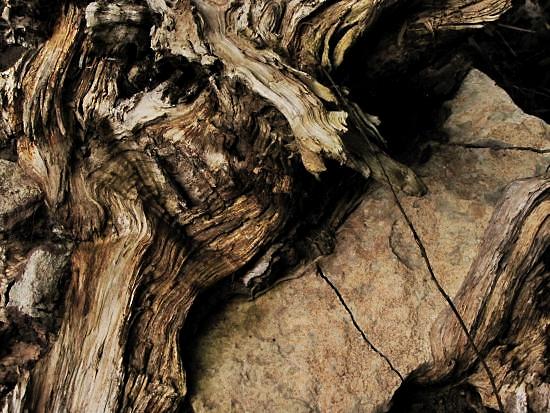
photo - mw

Long Island Locks 14-16
_______________________
from constant change figures
Lyn Hejinian
constant change figures
the time we sense
passing on its effect
surpassing things we've known before
since memory
of many things is called
experience
but what of what
we call nature's picture
surpassing things we call
since memory
we call nature's picture
surpassing things we've known before
constant change figures
experience
passing on its effect
but what of what
constant change figures
since memory
of many things is called
the time we sense
called nature's picture
but what of what
in the time we sense
surpassing things we've known before
passing on its effect
is experience
from Bay Poetics, 2006
The seeds of its own unfolding
PoemTalk on Lyn Hejinian's "constant change figures"
Lyn Hejinian at the Poetry Foundation and EPC
_______________________
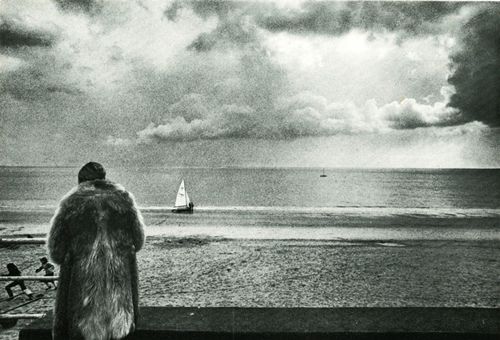
Eddie Kuligowski
Paris Month of Photography 2012
LensCulture
_______________________
Nonsense Aesthetics: (Imaginary) Living After the Death of Falsity
David Cecchetto
Ted Hiebert
ctheory
... what if we weren't quite satisfied with physical impossibility as grounds for dismissal? That is, what if we took this physical impossibility not as a cue to look to another explanation, but rather as a method of sustaining and focusing the imaginative possibility that underwrites impossibility, as well as the impossibility that underwrites possibility itself? In short, what if we recalibrated the humanist injunction to mean away from the goal of understanding what is possible and towards the goal of imagining new impossibilities? Instead of debunking phlogiston in the name of what is already known, we might instead come to bear on the precise ways in which knowledge is always simultaneously a form of not-knowing. Moreover, we might take seriously the possibility that it is this negative knowledge -- these delusions -- that "maintain the integrity of the question[s]" we ask in and through our daily lives.
Asking these questions in this way -- and asking them in the context of "the death of falsity" that accompanies postmodernism's death of truth -- seeks to replace the horizon of truth with "a horizon of imaginative possibility." Such is precisely the impulse behind In Praise of Nonsense, Ted Hiebert's vertigo-inducing meditation on nonsense as a lived vector of quotidian postmodernism....(more)
_______________________
The Quiddities
"Take this from this, if this be otherwise": an essay on literary minutiae.
Joe Milutis
Triple Canopy
(....)
How is it that a word so attuned to our presence in a single moment has led us to such a comedy of absence? Is there a way to return to the shock of our thisness in the world, after we’ve moved through the humbling uncertainties of these notable thises? After all, each this—digitized, arrayed, and quantified, as if in a gallery of pronominal butterflies—tells us very little about its life, even though it’s animated every time we eye it.
This dwells in the ephemeral; it passes. When not pinned down, it announces freedom from meaning and interpretation; it “designates, but keeps silent,” as Roland Barthes has written. So try as we might to classify that freedom, we are left without words. But is the presentist philosophy announced by every this ill equipped to fathom the very world that allows one to access and organize these instances? When we make this speak, from the depths of its massive archive, what is the terrible sound? Is it everything that literature seeks to avoid, or everything it seeks to say?...(more)
_______________________

photo - mw
_______________________
Translation's homeopathic gesture
Erķn Moure
(....)
The body responds, but cannot ever forget or avoid its cellular infarction, movement or life below conscious choice. Its response is different to different texts, and to the same text at different intervals. The text always demands something of the body seated in front of it; it urges something from that body.
As translator, I respond to the urge of the text, its urgency. This involves my mind, which, like any mind, is acculturated, constructed by the culture in which it lives. Tripwire. In the words of Giorgio Agamben, the process is one of subjectivization and of desubjectivization at the same time. It is a process that cannot be fully controlled by society, however, because it passes through a human body.
The homeopathic gesture that propels translation comes from the interior heat of a set of cells. Outside of any theory of translation, these cells function. They renew the fibres of their DNA. Proteins. In the moment of translation, there is no theory possible. Only this relation of light and cell which has a homeopathic influence on the language that results. ...(more)
|

